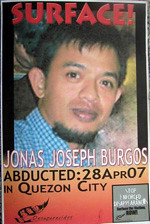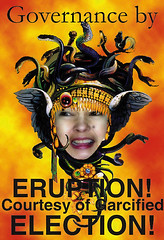The Arroyo History of Jueteng
Courtesy of MIla Aguilar via email:
This was circulated way back in 2004, but let's remind each other of it constantly until it sinks in.
The antagonist in this story is named Mariano Arroyo.
Don Mariano Arroyo, the disgraced governor of Iloilo, was dismissed by the American governor-general in 1930 for being a jueteng protector and coddler.
He had a brother, Jose Arroyo y Pidal.
Jose Arroyo y Pidal is the grandfather of Atty. Jose Miguel Arroyo y Tuason, the so-called First Gentleman. Jose Miguel's nickname is Mike.
Jose Pidal was the name used in a multimillion bank account, one of the earliest among more than a dozen scandals to rock the alleged presidency of Gloria Macapagal-Arroyo.
The Pidal bank account is one of a myriad reasons why people are saying today:
The antagonist in this story is named Mariano Arroyo.
Don Mariano Arroyo, the disgraced governor of Iloilo, was dismissed by the American governor-general in 1930 for being a jueteng protector and coddler.
He had a brother, Jose Arroyo y Pidal.
Jose Arroyo y Pidal is the grandfather of Atty. Jose Miguel Arroyo y Tuason, the so-called First Gentleman. Jose Miguel's nickname is Mike.
Jose Pidal was the name used in a multimillion bank account, one of the earliest among more than a dozen scandals to rock the alleged presidency of Gloria Macapagal-Arroyo.
The Pidal bank account is one of a myriad reasons why people are saying today:
Z -Zobra Na
T -Tama Na
E -Exit Na!
 The Arroyo History of Jueteng........... a serious article.
The Arroyo History of Jueteng........... a serious article.(From the book: Phoenix: The Saga of the Lopez Family, Vol. 1 by Raul Rodrigo, pp. 105 to 106)
In Iloilo in 1929, the king of jueteng was a Chinese named Luis Sane, widely known as Sualoy. He operated with impunity; his establishments were safe from raids; secured, it was said, by generous bribe money to politicians and the local police.
In September 1929, Ening [Lopez] and El Tiempo began a crusade against jueteng in Iloilo and the corruption it created in local government. The winning number each day was printed in a box in boldface on page one. Ening came out with one expose after another, alleging that top politicians such as Iloilo Governor Mariano Arroyo, Iloilo City police chief Marcelo Buenaflor and his brother Congressman Tomas Buenaflor, had been bribed by Sualoy to turn a blind eye on jueteng.
Ening did not choose lightweight opponents. Mariano Arroyo was the most powerful man in the province. He was the brother of the late Jose Arroyo, a Nacionalista senator and good friend of Quezon. As the public's outrage over the corruption began to mount, Arroyo issued a statement that jueteng did not exist in Iloilo. That it did and that local officials benefited from it were matters of public knowledge in the city. The question was not what needed to be done, but who had the courage to do it. As it turned out, Ening Lopez did.
In March 1930, due to the pressure created by El Tiempo, Sualoy's headquarters was finally raided; not by the do-nothing local police, but the Philippine Constabulary. Sualoy was arrested, found guilty and jailed. He was eventually deported and died in China. With Sualoy out, the conflict had narrowed to a match between El Tiempo and the governor. The crusade had captured the imagination of Iloilo and made El Tiempo the city's leading newspaper. In August 1930, pushed against the wall, Governor Arroyo sued El Tiempo for libel. Ening struck back by filing administrative charges against the governor. He also called in his friend and former boss Vicente Francisco to lead his defense against the libel charge.
As the struggle intensified, some Lopezes sensed in it some unwelcome echoes of the political tempest that had taken the life of Ening's father (Benito Lopez) 22 years before. El Tiempo's editor, Jose Magalona, was badly beaten by a local thug who was believed to be in the employ of the governor's men. The older Lopezes were afraid that as the row grew more heated, Ening might eventually share his father's fate.
Fortunately, news of the case had reached Manila and attracted the attention of (American) Governor General Dwight F. Davis. Governor Arroyo and his cohorts came under minute scrutiny. As a result of the scandal, the Nacionalistas and Quezon began backing away from Arroyo.
When Arroyo asked Quezon to recommend to Davis that he be acquitted of the administrative charges filed by Lopez, Quezon refused. Instead, Davis swiftly dispatched Judge Manuel Moran (later chief justice of the Supreme Court), to investigate the libel case. Moran established that Arroyo and the police chief were in fact heavily involved in illegal gambling. They even ran a gambling den as a means of generating money for the upcoming 1931 elections. Moran concluded that Ening and El Tiempo had not been guilty of libel.
In Arroyo's trial on the administrative charges, even more damning evidence against the governor came out. Pio Sian Melliza, a boyhood friend and active supporter of the governor, testified that when he had asked his friend to finally crack down on jueteng, the governor told him:
"Compadre, why are you so determined to get rid of jueteng gambling? Isn't it clear to you that most of the jueteng runners and sellers are our own political ward leaders? The elections are nearing, and I am running for re-election. Not including the money they are giving us for election expenses, they can hurt us in this election, because there are many of these jueteng runners in this province".
On October 7, 1930, Governor General Dwight F. Davis ordered Governor Mariano Arroyo relieved of his post for corruption. Timoteo Consing, a friend of Ening, was named as his replacement. Iloilo Mayor Eulogio Garganera and Marcelo Buenaflor were suspended. The ex-governor staged a protest rally and attempted to make a political comeback, but his disgrace had been marked and he sank into obscurity.

























4 Speak Out:
This is so depressing. Nakakapanghina ang ganitong mga bagay. Para bang wala nang pagbabagong mangyayari sa bansa natin. Ganito na lang ba talaga tayo? Puro panlalamang at panggugulang para sa pansariling kapakanan.
Sana talagang dinggin ng ating Panginoon ang ating panalangin na ang bansa natin ay mabasbasan at mabigyan ng maraming mga lider na magdadala sa bansa natin tungo s kapayapaan at kasaganaan
Lester,
I think our situation is not that hopeless. Depressing? Not totally though.
Sa dami ng ating mga pagkakamali, siguro may natutuhan naman tayo ng mga ilan. Sana nakita na natin ngayon na hinde lang nasakamay nang ating mga lider ang tama at marangal na pamamalakad ng bayan kundi NA SA KAMAY DIN PALA NG ATING MAMAYAN.
We REALLY have an active obligation to be vigilant and to perform our civic duties in good governance otherwise we would always have the likes of Erap, Gma/mike,the Pinedas of jueteng gate, the Singsons, JDV, at maraming pang ibang mga kenkoy na kung saan pang kweba galing, leading us and sitting at the helm of our government.
Let us pray that may we not forget that we, the people, deserve the leader we choose and the country we make.
Nasa ating mga mamamayan NGAYON ang bukas na darating. And for that matter, GMA must go.
Tama na. Sobra na. Alisin na. NGAYON NA.
Pedestrian Observer,
Tama nga siguro ang kasabihan. From sows, we get swines. Sa baboy, galing ang baboy.
Fidel,
Talaga nga naman oo, kaya pala eh saan pa nga ba magmamana ang biik kung hindi sa pamilyang baboy, hahaha.
Post a Comment